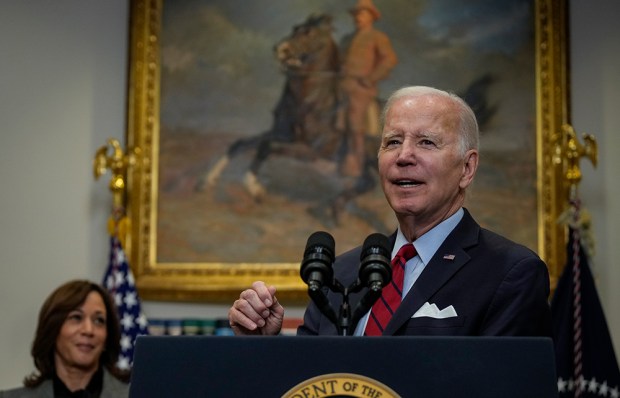Moments arrive when it becomes clear you’re losing the zeitgeist. Whatever might be the spirit of the era, you don’t get it any more. For me such a moment occurred last week as I followed news and commentary about the footballer Marcus Rashford’s campaign for meal vouchers for disadvantaged children during the school holidays. A Nottinghamshire Conservative MP, Brendan Clarke-Smith (Bassetlaw), had spoken in the Commons debate. ‘Where is the slick PR campaign encouraging absent parents to take some responsibility for their children?’ he asked. ‘I do not believe in nationalising children.’
‘Brilliant!’ I thought. And well put. Of course I don’t believe that all children who go hungry do so because their parents can’t be bothered; there will be as many different circumstances as there are deprived families. But ever since I tried living on the dole as an MP in the early 1980s I’ve known that you can eat healthily very cheaply. What caused my downfall in that programme was paying (as my TV bosses demanded) to attend a football match. Help and advice with getting priorities right, budgeting and preparing inexpensive meals is tremendously important, especially for disorganised families; but, as Clarke-Smith suggested, such a campaign wouldn’t tug the heartstrings as easily as Rashford’s celebrity-led operation has done. A famous, public-spirited and very likeable footballer could do much for a healthy-living-on-a-tight-budget campaign. But it’s easier just to campaign for the government to give people more money.
As for the phrase ‘nationalising children’, I thought the MP was spot-on. Nearly four months ago, when Rashford’s proposals were first resisted then accepted by government, I wrote for the Times arguing that ministers had ‘lost their footing, and must finally slide all the way to the provision of meals or vouchers for poorer children all year, in or out of school’.
‘Why for summer but not Christmas?’ I asked. ‘And how about the winter clothing of poorer children?… It may take years, but that’s where the logic leads.’ I still think that. And what about the under-fives who don’t even go to school? If their older siblings are to get meal vouchers, how do we resist the argument that meals should be provided by the state for all children from poor families?
So when I read Clarke-Smith’s Commons remarks I expected that the MP would get good support from many. That’s what I mean about missing the zeitgeist. The world came down on Clarke-Smith like a ton of bricks. He was quoted on the BBC as though his remarks were an obvious gaffe. He hit a storm of social media abuse. So did almost anybody who put heads above the parapet to question the logic or wisdom of the Rashford campaign. I was startled by the apparent failure of almost anyone to make the sceptical case.
At which point you may think I would have seized the opportunity to use what platform I have to do this. And you’d be wrong.
One of the big BBC radio news programmes phoned. They’d read my earlier Times piece. Would I now make those arguments again, this time on air? I thought about it… and heard myself saying this: ‘Sorry, but I don’t want to lose what remaining friends I have. There’s a gale-force prevailing wind against my argument. It’s a lost cause so I can’t see the point in just sounding nasty on the radio. Forgive me.’
Then Newsnight rang. Then BBC Radio Scotland. Then the News Channel. Researchers were obviously desperate to ‘balance’ the Rashfordites. ‘That’s what everyone’s saying,’ they lamented when I declined. ‘Can you think of anyone reasonably articulate who could give us a bit of push-back to the meal vouchers campaign?’ I honestly couldn’t. ‘Well,’ I’d reply, ‘there’s a range of ghastly old grizzled mean-bastard Tory MPs who’d do it for you, I suppose.’
‘Yes, that’s the problem,’ the researcher would remark. ‘We’re looking for someone who isn’t one of the usual suspects.’
Well it wasn’t going to be me. Not this time. I’m ducking. I can’t just rewrite my July Times column; I’ve said all that already. In writing this for The Spectator I’m comforted to feel myself in the company of a body of readers many of whom will appreciate my argument. Strange, this, but true; alone with a cup of coffee at my desk as rain spatters the window, it does make a difference. But you are not typical, believe me. You and I are missing the zeitgeist.
Two questions arise. Should we ourselves stick to our guns and fight on? And should this Conservative government fight on?
As to the second, I begin to wonder. This could have been handled so much better, and should have been anticipated. That universal credit has been increased by £20 per week, school day, holiday, every day, seems to have passed unremarked. The only really persuasive voice I’ve heard (on the Today programme last Saturday) was that of the Conservative MP David Simmonds, who didn’t sound mad or mean, and really knew his stuff. But the initiative has been lost, and I suspect the worldly-wise advice to government is that this is not a ditch to die in.
But which ditch, then? Should you or I, with no need to be re-elected, surrender to the spirit of the age? I don’t know. I can only quote Thornton Wilder, writing in The Bridge of San Luis Rey, about an 18th–century abbess who believed in women’s equality. She was, says Wilder, ‘one of those persons who have allowed their lives to be gnawed away because they have fallen in love with an idea several centuries before its appointed appearance in the history of civilisation. She hurled herself against the obstinacy of her times.’
Unlike the abbess, we shall not have to wait several centuries to make the argument for personal responsibility. But I fear it may be quite some time. And I weary of hurling myself against things and sounding mean.
Got something to add? Join the discussion and comment below.
Get 10 issues for just $10
Subscribe to The Spectator Australia today for the next 10 magazine issues, plus full online access, for just $10.
You might disagree with half of it, but you’ll enjoy reading all of it. Try your first month for free, then just $2 a week for the remainder of your first year.















Comments
Don't miss out
Join the conversation with other Spectator Australia readers. Subscribe to leave a comment.
SUBSCRIBEAlready a subscriber? Log in